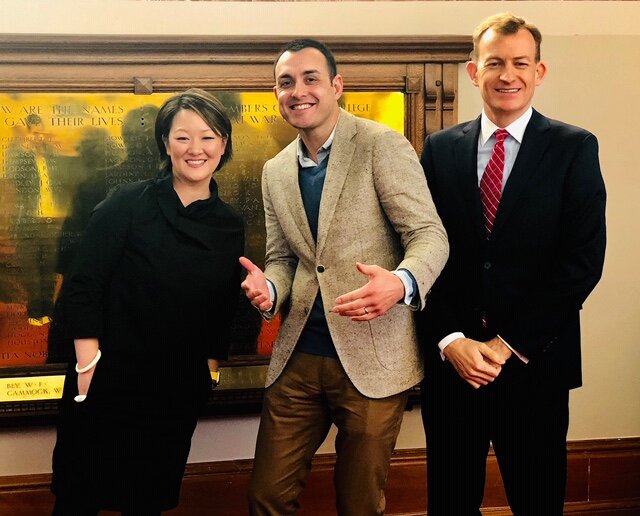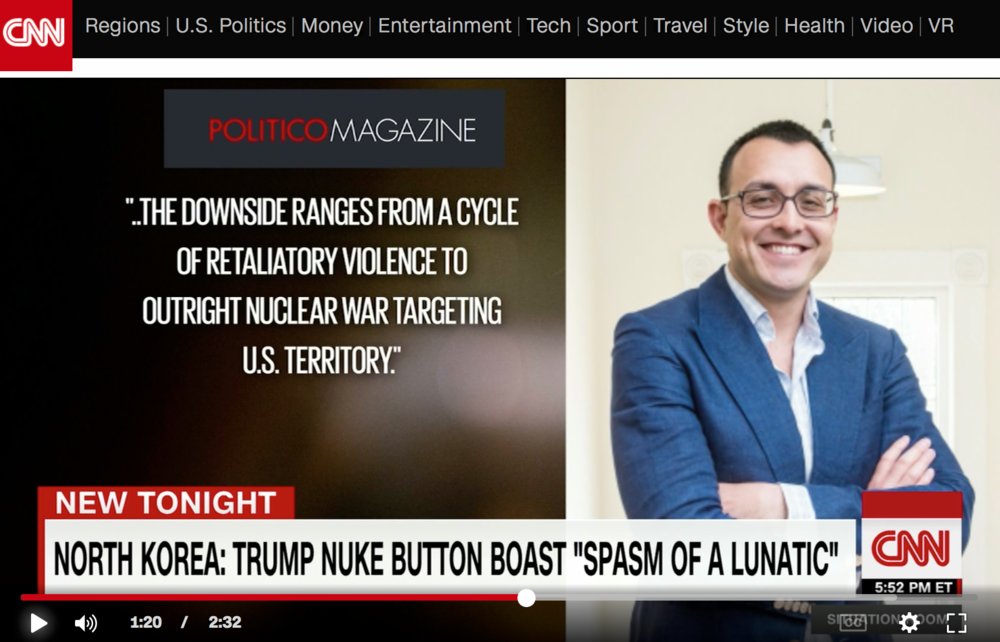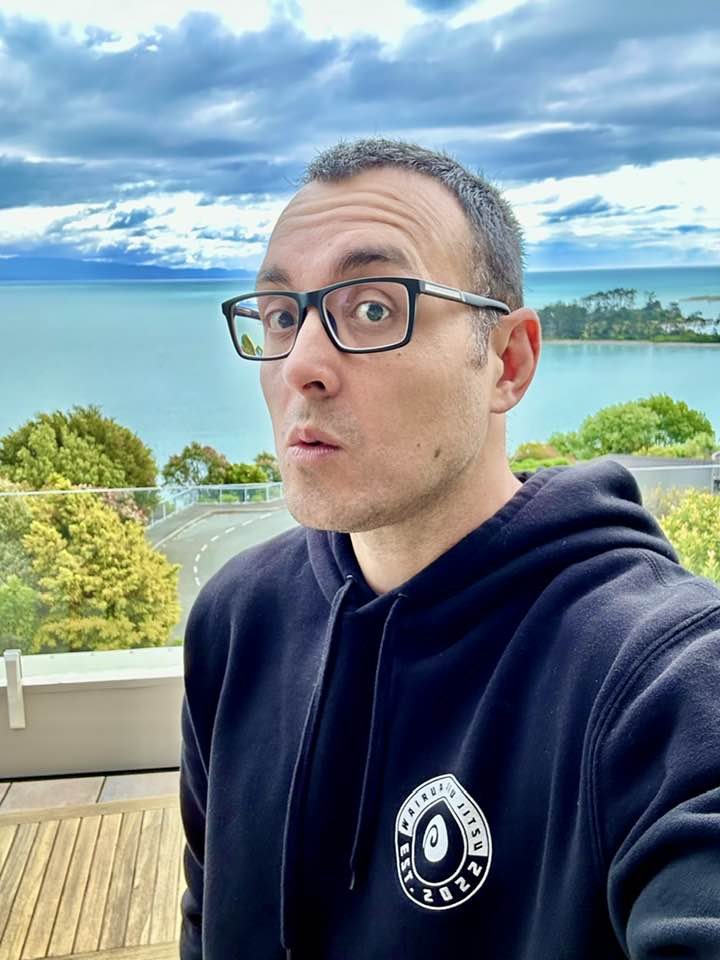Biography
I have a formal biography below, but it reads like it was generated by an A.I. The main thing to know: My career has required me to spend a lot of time with elites of various sorts, and I’ve basically figured out how to be among them without embarrassing either them or me. But I’m very…shaped…by my working class* beginnings. Things are different now—I’ve gotten lucky—but I grew up poor. During high school, I worked at Wendy’s (literally mopped the floors until a spot opened at the fry station) and a greyhound racing track that had mob ties. I was enlisted in the Air Force, not an officer. I attended two community colleges—Monterey Peninsula College and Community College of the Air Force—before eventually getting my undergrad degree from a University of Maryland satellite campus, because it was the only way to take night classes while serving in the military. I was the first person in my family to get a four-year degree. My political consciousness started with trying to make sense of the L.A. riots in 5th grade, followed by a deep love of ‘90s hip-hop that endures even now.
I walked away from a career in management consulting (which sucked) to do foreign policy. I was studying for a PhD at night while doing strategy in Obama’s Pentagon during the day. Eventually I got my PhD, leveraged it to become an academic, and then leveraged that to become something of a public conscience to my friends (and enemies?) who still work in national security. In between I’ve had ties to every “non-partisan” Washington think tank that does national security, made an award-losing documentary, and served as an unpaid foreign policy adviser to four of the Democratic presidential campaigns during the 2020 election (not at the same time).
I hate that I owe my early career to the vast expansion of the national security state after 9/11. Most of my friends come from that world. But I’ve gradually become one of its major critics, which makes things awkward around the holidays. A constant source of my nagging dissatisfaction with how national security policy works is that it’s utterly by and for elites. On a good day, the national security state neglects the little guy, and siphons resources that might make his life better. On a bad day, it makes the little guy cannon fodder, and usually for reasons that are strategically dubious. I teach this stuff for a living, and have theories and prescriptions for how we could be taming, rather than inflaming, geopolitics. Because my critiques are informed by experience inside the machinery, I’ve been called a “blob defector” and a “dissident among foreign policy intellectuals”—I’d like that to be normal rather than a distinction.
I’m a natural introvert, and would honestly prefer to live a quiet life by the ocean. But the Trump years were jarring, a political awakening for me. I got free from Washington at a pivotal historical moment. My old friends might not admit it now, or might have chosen to forget, but in those early Trump years most of us tried to escape the Beltway; I was one of the few who actually pulled it off. That means I owe a debt of truth-speaking. A lot of my old Beltway friends have no such freedom.
*If you earn a wage for a living, you’re a worker. But the life and culture that’s built up around what we think of as working class—compared to “middle class” or white-collar work—is just very different. If you haven’t lived it, you probably can’t appreciate it. Which is only to say that “working class” is not a fixed identity category but rather a unique, precarious relationship to capital. Interested in exploring what it means to see like a worker? Start here:
(paywalled) Listen to The Nostalgia Trap podcast, episode critiquing Obama’s Netflix docuseries, “Livestream 5.26.23: Working with Obama”
Listen to the Know Your Enemy Podcast (Matthew Sitman and Sam Adler-Bell), the episode with Gabriel Winant, “The Right Kind of Worker”
Poor People’s Campaign, Poor People’s Moral Budget
Maximillian Alvarez, “Can the Working Class Speak?” Current Affairs
Barbara Ehrenreich, Nickel and Dimed: On (Not) Getting By in America
Beverley Silver, The Forces of Labor: Workers’ Movements and Globalization Since 1870
Rachael Allen, “Difficult and Bad,” Too Little/Too Hard
Frances Fox Piven and Richard Cloward, Poor People’s Movements: Why They Succeed, How They Fail






























Official Bio
Dr. Van Jackson is an American-born scholar of international relations specializing in East Asian and Pacific security, critical analysis of defense issues, and the intersection of working-class interests with foreign policy. He is a Senior Lecturer in International Relations at Victoria University of Wellington, and a Senior Research Scholar at Security in Context, where he is also Co-Director of the “Multipolarity, Great-power Competition, and the Global South” project. He was appointed a Havens/Wright Visiting Scholar at the Havens Wright Center for Social Justice, University of Wisconsin-Madison for 2024-2025. Additionally, he concurrently holds think tank appointments as a Senior Non-Resident Fellow at the Center for International Policy, Distinguished Fellow at the Asia Pacific Foundation of Canada, as the Defence & Strategy Fellow at the Centre for Strategic Studies in Wellington, New Zealand, and as a Senior Fellow in the Asia-Pacific Leadership Network for Nuclear Non-Proliferation & Disarmament.
Van's first book, with Cambridge University Press, was Rival Reputations: Coercion and Credibility in U.S.-North Korea Relations (2016). His second book, also with Cambridge University Press, is On the Brink: Trump, Kim and the Threat of Nuclear War (2018). His third book, with Yale University Press, is Pacific Power Paradox: American Statecraft and the Fate of the Asian Peace (January 2023). His fourth book, with Cambridge University Press, is Grand Strategies of the Left: The Foreign Policy of Progressive Worldmaking (November 2023). And his fifth book, The Rivalry Peril: How Great-Power Competition Threatens Peace and Weakens Democracy, is forthcoming with Yale University Press.
In 2021, Van began writing regularly for the Duck of Minerva, and in 2022 started also writing The Un-Diplomatic Newsletter. In 2019, Van was featured in the Washington Diplomat’s “People of World Influence” series.
Van has testified before the House Committee on Foreign Affairs, Subcommittee on Asia and the Pacific, and has appeared widely in the media, including on The Majority Report with Sam Seder, HBO’s Vice News Tonight, CNN, National Public Radio, BBC Radio, The American Prestige, and Planet America. His written work has appeared in Foreign Affairs, Dissent, The Nation, Jacobin Magazine, Current Affairs, New York Times, Washington Post, The Atlantic, and many other places.
From 2009 to 2014, Van held positions in the Office of the Secretary of Defense (OSD) as a strategist and policy adviser focused on the Asia-Pacific, senior country director for Korea, and working group chair of the U.S.–Republic of Korea Extended Deterrence Policy Committee. He is the recipient of multiple awards in OSD, including the Exceptional Civilian Service Medal.
Van started his career in the U.S. Air Force as a Korean linguist and intelligence analyst, and was an honors graduate from the Defense Language Institute in Monterey, CA.
Book Praise
“Van Jackson has given us a vital record of a near-disaster. Vigorous, wise, and highly informed, ‘On the Brink’ decodes the theatrics and leaves the lesson inescapably clear for future generations.”
—Evan Osnos, The New Yorker
"Van Jackson has written an insightful, detailed, and frightening history of the Korean nuclear crisis. It is like a thriller with the sequel yet to be written."
—Scott Sagan, Stanford University Professor and author, The Limits of Safety
